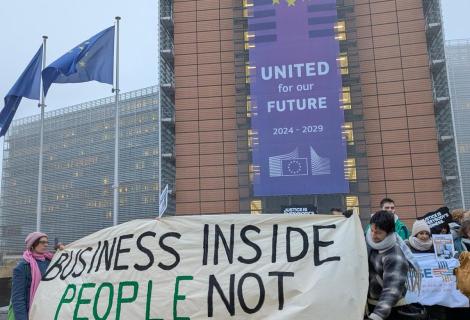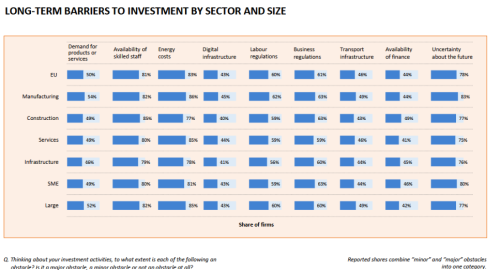The Commission’s Simplification Package: Hold Up on European Democracy!

As a follow up to our work on corporate due diligence and as a response to the Omnibus proposal, the piece provides an analysis on the European Commission's Competitiveness Compass, a roadmap recently released that outlines the Commission's attempt to redress the European economy. The bottom line is that such measures fail in justifying the need to reduce regulations and are being put forth without proper adhesion to EU democratic procedures.
European companies have operated for decades in global markets without proper due diligence mechanisms to protect the most vulnerable in the global South. Human rights violations, environmental degradations, land grabbing and discrimination have been the other side of European corporate profits for too long. When you are a Bangladeshi garment worker or an environmental activist in Tanzania, you have much more probability to experience a harmful impact from European companies settling in your area than benefiting from it. These harms are even more disproportionate if you are a woman or part of a minority group, exacerbating existing inequalities and discriminations.
While not initially part of the Green Deal package, the EU Corporate Sustainability Due Diligence Directive sought to address this impunity. Despite a wide mobilisation of CSOs, progressive businesses and some courageous MEPs, the text was eventually significantly watered down before its adoption, mainly by Member States, lowering for instance the number of companies falling under the obligations of the Directive. CSOs still celebrated the regulation as the political message was strong: the (beginning of the) end of corporate impunity for EU companies operating in the Global South. We thought that a woman whose rights are violated while working in the supply chain of an EU company would now finally be protected against corporate impunity. We thought that EU biggest corporations would now take the 1.5° Paris Agreement objective more seriously and publish plans to decarbonise their activities. All this is now in danger! In the name of “Competitiveness”.
“Competitiveness is front and centre of this mandate” reads the Competitiveness Compass, a roadmap released by the Commission a few days ago, outlining its approach to redress the European economy. In line with the Letta and Draghi reports, it calls for an “unprecedented simplification effort” of the EU regulatory framework. The argument goes that the lack of innovation in Europe is due, among other things, to a mountain of regulatory and administrative hurdles that hinder growth and investments. A major simplification of the regulatory framework, and even a “regulatory pause” as suggested by the French President, would unleash the growth potential of EU companies and innovation. While none of the other concerns expressed in these reports, such as the EU’s lack of investment capacity or the shortfall of skills in the Union have yet been addressed, the Commission will soon table its Omnibus regulation, the Commission’s legislative package that will aim at “a far-reaching simplification of the sustainable finance reporting, sustainability due diligence and taxonomy.”
From evidence-based policy making to speculative assumptions
While many proposals in the Compass are certainly useful for European companies to thrive and innovate, it is dangerous that the Commission is willing to re-open these legislative files instead of acting through executive acts to harmonise the implementation. In fact, France and Germany openly call for the Commission to weaken and delay the sustainability requirements. This is a serious attack on democratically adopted pieces of legislations. These regulations have mostly been adopted under the Green Deal strategy during the previous mandate. While growing voices emanating from the far right have pointed to the Green Deal as a source of burden for European companies, it would be alarming if these voices are now echoed at the very heart of the Commission. There is no evidence that these regulations will negatively affect EU’s competitiveness, quite the opposite according to the EU’s own findings. In fact, the Commission has found, in 2022, in its impact assessment on the Corporate Sustainability Due Diligence proposal that “no significant negative distortions are expected as regards the competitiveness of EU companies in global markets and the mid to long-term competitiveness impacts are expected to be positive”. This policy shift erodes the trust in the Commission itself.
What is worse, the Letta and Draghi reports as well as the Competitiveness Compass all fail to justify the need to reduce the regulatory burden. One report cites testimonies made to the author as part of his consultation work while the two others refer to the European Investment Bank’s investment survey from 2023 which identifies regulatory burden as one of the long-term barriers to investments for European companies. While 61% of European companies do identify “business regulations” as a barrier to investments, this is less than US companies vis a vis US regulation. Interestingly, these surveys indicate that it is only the 4th concern for EU companies, well behind “energy cost” and “uncertainty about the future”. The Green Deal, despite weaknesses, has the merit precisely to give a clear direction of travel to European businesses. Similarly, the current confusion created by the Commission’s policy shift, particularly among the transition finance community, will not help reduce the price of energy in the EU, which is disproportionately affected by its dependence to a geopolitically fragmented world. If this survey was a serious reference for the Commission, it would instead urge it to act faster and double down on the Green Deal objectives, not casting doubt about their political relevance.

The corporate capture of EU decision making
While nothing really justified to act so urgently to amend a set of regulations that have for most of them not yet entered into force, the Commission is breaching the fundamental rules of EU policy making. Firstly, the Commission has not conducted any new impact assessment which is also a legal requirement. There has been no public and transparent consultation yet from the European Commission in violation of its own Better Regulation Guidelines (BRG). The invitations-only meeting being held at the moment exclude most of the CSOs organisations that have been working on these files for years and who seek to represent the voices of the most vulnerable. The BRG goes even further and requests the EC to avoid “regulatory capture” and to explicitly consult a broad range of constituencies. Instead, it is now consulting a very specific set of companies whose interest are not aligned with the radical and fast transition that people and the planet require. It is therefore breaching the democratic principles enshrined in the EU treaties, particularly Article 1 TEU that provide European citizens with the right to participate in the democratic life of the Union.
Time for mobilisation to protect European democracy
NGOs are mobilising today to fight back on this unlawful and total capture of EU policy making. The reality of Member States’ and the EU Parliament’s political majorities give little chance for strong opposition to the text that will be tabled at the end of February in the co-decision procedure. CSOs, trade unions, progressive political forces and businesses need to mobilise widely to protect human rights and the environment both within the EU and outside of its borders, as part of the fundamental values that bring us together as a European Union.
In a context where democracy is threatened systematically by obscure political forces, the Commission needs to stand strong on the values that are at the heart of the Union by acting as the “Guardian of the Treaties”. And all democrats need to ensure the Commission does act in accordance with EU regulation and Treaties.